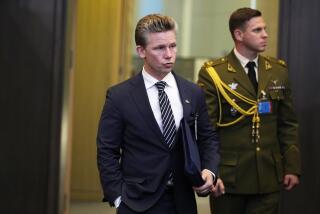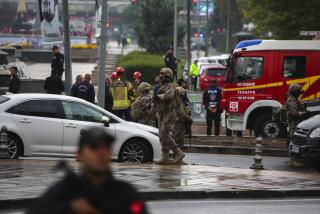German Defense Minister Quits Over Arms Deal : Diplomacy: Tanks sold illicitly to Turkey have seriously strained relations between the NATO partners.
- Share via
BERLIN — Defense Minister Gerhard Stoltenberg was forced to resign Tuesday over an illicit arms deal that has seriously strained relations between Germany and Turkey.
The 63-year-old political crony of Chancellor Helmut Kohl stepped down after officials in his ministry defied or failed to enforce a parliamentary ban against selling 15 Leopard combat tanks to Turkey.
Turkey claims it needs tanks to fight terrorist incursions launched from neighboring Iraq by Kurdish nationalists. Bonn has sharply criticized Turkey for its recent crackdown on the Kurds, alleging that it has used German-supplied weaponry to attack civilians, a charge Turkey denies. Last week the government froze all military aid to the NATO ally.
That move so incensed Turkey that its president pointedly compared Kohl’s government to the Third Reich. Complaining that Bonn is meddling in other nations’ affairs, Turkish President Turgut Ozal said in a newspaper interview Sunday: “Hitler’s Germany did the same thing.”
On Monday, the chancellery issued a statement calling the “tone and contents” of Ozal’s comments “incomprehensible.”
Millions of Kurds live on both sides of the Iraqi-Turkish border, and nationalists among them are fighting both governments for the creation of an independent Kurdish homeland. The most prominent, and violent, separatist group is the Marxist Kurdish Workers’ Party (PKK).
Germany is Turkey’s No. 1 trade partner and second only to the United States as a supplier of arms.
The Bush Administration has expressed support for Turkey’s fight against what it calls “terrorist groups” such as the PKK but has also said it hopes that military operations against them can be completed quickly and without harm to civilians.
On Tuesday, the U.S. position seemed to toughen. “We’ve told the Turks that the fight against terrorism cannot be allowed to abrogate its responsibilities to protect the human rights of all its citizens,” State Department spokesman Richard Boucher told reporters.
Stoltenberg, a member of Kohl’s conservative party, the Christian Democratic Union, was embroiled in another weapons scandal last October when customs officials in Hamburg intercepted military hardware illegally bound for Israel.
Crates seized at Hamburg’s harbor had been labeled “farm equipment” but actually contained weapons and hardware from the defunct East German army. The German intelligence agency, the Bundesnachrichtendienst, admitted that it was sending the arms to its Israeli counterpart, the Mossad, without informing the Bonn government.
A top Kohl aide was forced to resign, but Stoltenberg held fast to his post despite opposition charges that he had lost political control of the ministry.
Stoltenberg had tried Monday to silence fresh calls for his resignation by firing one of his senior aides, Wolfgang Ruppelt, who was held responsible for the illegal tank delivery. But the pressure did not ease, and on Tuesday two other top aides resigned along with Stoltenberg.
Last November, the Bundestag, or lower house of Parliament, responded to reports of attacks on Kurdish civilians by freezing funds destined for the tank delivery. But the German company responsible for refitting and sending the equipment apparently was never officially informed of the decision.
With Kohl at his side, Stoltenberg announced his resignation at a news conference in Bonn. He reiterated his contention that the shipment of 15 tanks was merely a bureaucratic slip-up.
As Kohl sometimes smiled and nodded his approval, Stoltenberg said he is quitting “to avoid damage to the CDU and the government.”
Two important state elections will be held Sunday.
The chancellor said he will nominate his party’s general secretary, Volker Ruehe, to succeed Stoltenberg.
In Bonn, the Turkish Embassy issued no formal statement on the resignation but indicated that the feud is far from over. Numan Hazar, deputy chief of mission, described the tank scandal as “a misunderstanding” over the security agreement between the two countries. He insisted in a telephone interview that “German weapons have never been used against civilians.” Such use of force by the Turkish military would be “impossible beyond imagination,” he said.
He complained of what he called German police indifference toward a series of Kurdish attacks against Turkish targets in Germany, including two of its 14 consulates, and a general “lack of protective measures” for Turkish diplomats.
“Last year, there were 150 attacks on consulates, banks and other targets,” Hazar said, “and this year there have already been almost 60.”
He alleged that PKK guerrillas are extorting “millions of marks” from Turkish citizens in Germany to buy arms. Germany is home to about 1.7 million Turks, about a fourth of them ethnic Kurds. Turks here often come under attack both physically and verbally by skinheads, neo-Nazis and other racist fringe groups.
More to Read
Sign up for Essential California
The most important California stories and recommendations in your inbox every morning.
You may occasionally receive promotional content from the Los Angeles Times.










